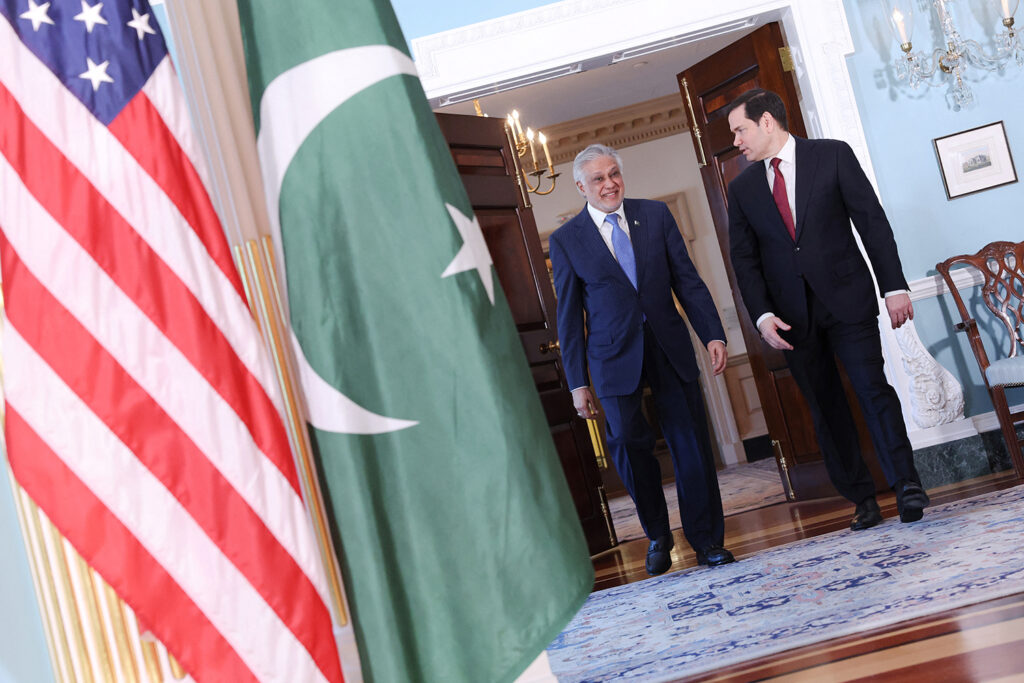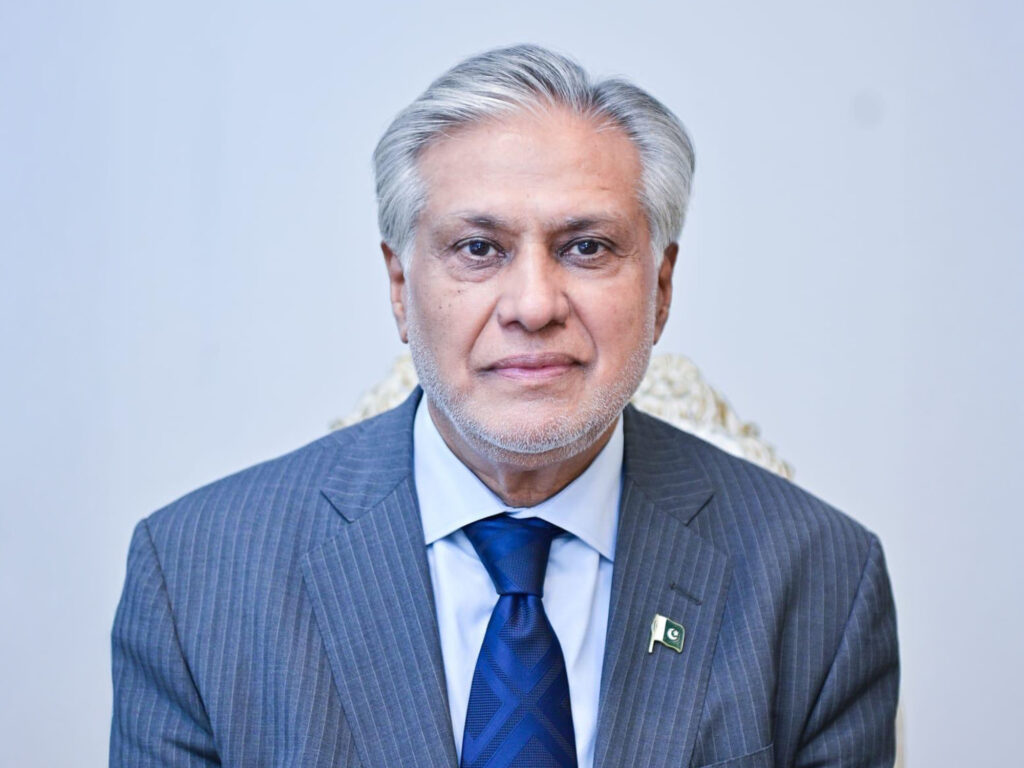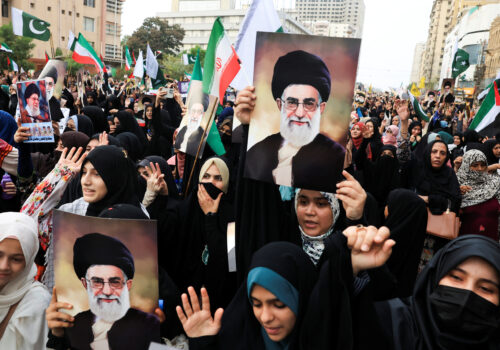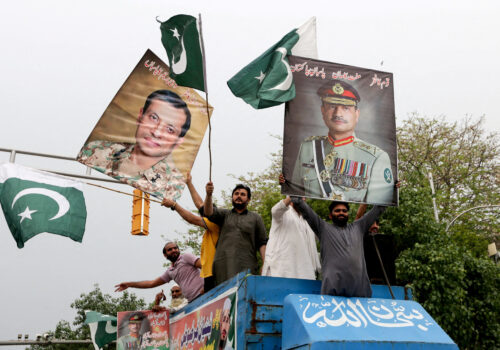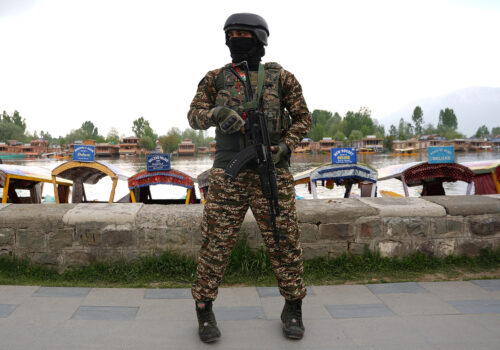Watch the event
A US-Pakistan trade deal is on the way, according to Pakistani Foreign Minister Ishaq Dar.
Dar, who spoke at an Atlantic Council Front Page event on Friday during his trip to Washington, said that the United States and Pakistan’s economic relationship has “ascended,” and the two sides are working on finalizing the trade deal, with the Pakistani prime minister’s office reviewing the deal to “fine-tune” it now.
“We hope to conclude a mutually beneficial trade agreement . . . hopefully in days, not in weeks.”
As for the specific tariff rate expected, Dar said that “as long as we are better than or equal to our peers, we should be fine.” US President Donald Trump has recently announced deals with Japan, Indonesia, the Philippines, and Vietnam, with tariff rates ranging from 15 percent to 20 percent.
Dar had met with US Secretary of State Marco Rubio earlier Friday. “We seek a relationship grounded not in dependency but in mutual benefit; not in blame, but in dialogue,” Dar said.
“We have to come out of this transactional relationship,” he added. “And it should be strategic, stable.”
Below are other highlights from the conversation, moderated by NBC News National Security Reporter Dan De Luce, which also touched upon the US-China relationship, Pakistan’s cease-fire with India, and Islamabad’s approach to diplomacy with Afghanistan.
Avoiding ‘bloc politics’
- While the United States is a “long-standing friend” to Pakistan, Dar said, China is a “strategic partner.”
- “Our foreign policy is not a zero-sum game,” he said. “We hope to see friendly relations between the US and China and do not wish to embroil in bloc politics.”
- Dar argued that Pakistan’s increasing engagement with China—including purchasing military hardware from Beijing—should not change the United States’ understanding of their relationship.
- “It’s a matter of who gives a better deal,” he said. “We should not be seeing the relationship through the lens of other [countries]. It has to stand alone.”
- Dar added that he believes Pakistan can serve as a “bridge” between the United States and China, which would be a “win-win for the globe,” as US-China cooperation “could help lift millions out of poverty,” he said. “Conflict, on the other hand, would prove disastrous for the entire world.”
The search for peace
- Dar explained that US-Pakistan cooperation is “on the rise” in part due to the United States’ role in securing a cease-fire between India and Pakistan, after the two countries traded airstrikes in May following a terrorist attack in the disputed Kashmir region in April. “The US has emerged as a credible arbiter of peace and stability in South Asia,” he said.
- On the cease-fire, Dar said that Islamabad is “committed to sustaining it.”
- This month, the US government designated the Resistance Front—which initially took responsibility for the April attack in Pahalgam—as a foreign terrorist organization, linking it to a Pakistani extremist group called Lashkar-e-Taiba (LeT). Dar said he would welcome “any evidence that it is involved” in the attack but argued that “linking it to the LeT is wrong” as, according to Dar, “that outfit was dismantled years ago by Pakistan.”
- Going forward, Pakistan and India “cannot” and “must not continue to rely on luck and last [-minute] interventions,” Dar said. “What we need is a sustainable architecture of peace in South Asia—an architecture in which the United States . . . can play a constructive and stabilizing role” through military coordination, counterterrorism cooperation, and diplomacy.
- “Regional peace, however, will remain elusive until all parties, including India, commit to a dialogue and dispute resolution in good faith and under international norms,” he said.
- Dar said that Pakistan is “ready” for dialogue with India, but Islamabad insists that any dialogue be comprehensive, touching upon not only Kashmir but also counterterrorism more broadly and even trade.
- Regarding Kashmir’s future, Dar said “the Kashmiri people should be given the right to decide.”
- Dar was also asked about the case of former Prime Minister Imran Khan, who was indicted for inciting violence after his supporters rioted in protest of his 2023 arrest on corruption charges, and whether it would impact Pakistan’s democratic reputation abroad. In response, Dar said that “if you are a popular political leader, it doesn’t give you license to pick up arms, to provoke [the] public, and to go and attack the security installation of a country.” Khan, who was behind bars at the time of the deadly attacks on military installations, has denied directing the violence.
One neighborly request
- In May, Pakistan announced it would send an ambassador to Afghanistan; and in June, Islamabad agreed to collaborate with Kabul on the Trans-Afghan Railway. Dar said that while Pakistan has not yet recognized the Taliban government in Afghanistan, these latest actions were taken “for the benefit of the people of Afghanistan.”
- Even with projects such as the Trans-Afghan Railway underway, Dar said that Pakistan will “continue to urge” the Taliban to “fulfill [its] antiterror commitments.” That “is the only ask,” Dar said.
- “We have to all work together,” Dar said, “to take all measures [to eliminate] this menace of terrorism from the globe.”
Katherine Golden is an associate director on the editorial team at the Atlantic Council.
Watch the full event
Further reading
Mon, Jun 23, 2025
Pakistan is maintaining strategic clarity amid the Israel-Iran war
MENASource By
Pakistan officials were quick to deny Iranian claims that Islamabad would engage in a nuclear response to a nuclear Israeli strike on Iran.
Mon, May 19, 2025
Amid India-Pakistan tensions, the US must rebalance its security priorities in South Asia
New Atlanticist By
The United States should make Pakistan’s Major non-NATO Ally status contingent on Islamabad’s counterterrorism performance and economic reform.
Thu, May 15, 2025
How South Asia’s ‘swing states’ navigate India-Pakistan tensions
New Atlanticist By
Bangladesh, Sri Lanka, Nepal, Bhutan, and the Maldives are quiet strategists in South Asia—but ignoring their roles risks destabilizing the region's fragile geopolitical balance.
Image: US Secretary of State Marco Rubio shakes hands with Pakistani Deputy Prime Minister and Foreign Minister Ishaq Dar at the State Department in Washington, DC on July 25, 2025. Photo via REUTERS/Jonathan Ernst.
